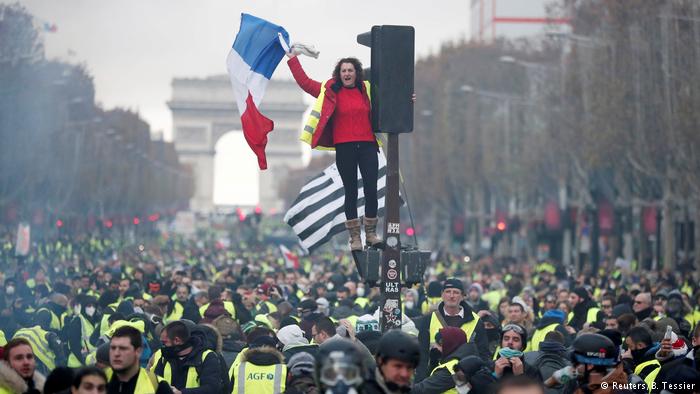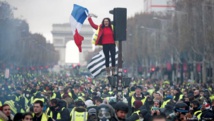Instead, Griveaux appealed to the Yellow Vests, saying that it was up to them not to protest and that it would be preferable if people instead took care of their businesses before the end of the year.
A ban wouldn't be sensible, he said, because it wouldn't prevent people from looting and rioting.
Protesters wearing fluorescent-yellow safety vests have staged rallies and blocked roads across France since mid-November, initially to protest against planned fuel-tax rises that the government said were necessary to support environmental programmes.
After more than three weeks of protests and two Saturdays running that saw riots in Paris, French President Emmanuel Macron admitted on Monday night that he had not acted quickly enough to boost workers' purchasing power since his election last year.
In a televised speech from the Elysee Palace, the centrist president promised a tax break on end-of-year bonuses and the complete exemption from tax and social charges of overtime payments.
Macron said Thursday on the sidelines of an EU summit in Brussels that his promise "does not hinder" France's will to control spending and that the new measures were a "legitimate and important" response.
"The choice I made in response to the anger - which I judge to be legitimate and fair - [was] the choice of strong support," he said.
"No country can advance if it does not also listen to that legitimate anger of its people," he added, giving the example of Brexit.
French Prime Minister Edouard Philippe defended the government's social policies in light of the ongoing protests before the National Assembly, where his government was facing a motion of censure filed by the three main left-wing opposition parties earlier this week.
The motion is unlikely to succeed.
Despite the concessions made by the government, many Yellow Vests interviewed by French media said that they mean to keep going.
US President Donald Trump blamed unrest in France on the 2015 Paris climate agreement, which the United States pulled out of last year.
"Because of the Paris accord, that whole country is burning down," Trump, who has never liked the agreement, told Fox News.
Tuesday night's shooting in Strasbourg left three people dead and one brain-dead, prosecutors said.
A ban wouldn't be sensible, he said, because it wouldn't prevent people from looting and rioting.
Protesters wearing fluorescent-yellow safety vests have staged rallies and blocked roads across France since mid-November, initially to protest against planned fuel-tax rises that the government said were necessary to support environmental programmes.
After more than three weeks of protests and two Saturdays running that saw riots in Paris, French President Emmanuel Macron admitted on Monday night that he had not acted quickly enough to boost workers' purchasing power since his election last year.
In a televised speech from the Elysee Palace, the centrist president promised a tax break on end-of-year bonuses and the complete exemption from tax and social charges of overtime payments.
Macron said Thursday on the sidelines of an EU summit in Brussels that his promise "does not hinder" France's will to control spending and that the new measures were a "legitimate and important" response.
"The choice I made in response to the anger - which I judge to be legitimate and fair - [was] the choice of strong support," he said.
"No country can advance if it does not also listen to that legitimate anger of its people," he added, giving the example of Brexit.
French Prime Minister Edouard Philippe defended the government's social policies in light of the ongoing protests before the National Assembly, where his government was facing a motion of censure filed by the three main left-wing opposition parties earlier this week.
The motion is unlikely to succeed.
Despite the concessions made by the government, many Yellow Vests interviewed by French media said that they mean to keep going.
US President Donald Trump blamed unrest in France on the 2015 Paris climate agreement, which the United States pulled out of last year.
"Because of the Paris accord, that whole country is burning down," Trump, who has never liked the agreement, told Fox News.
Tuesday night's shooting in Strasbourg left three people dead and one brain-dead, prosecutors said.









 Home
Home Politics
Politics











